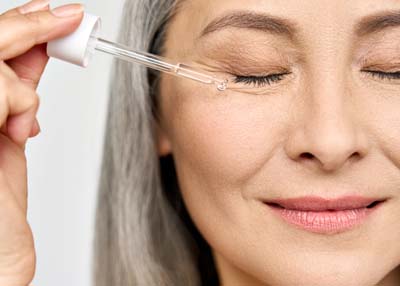Questions or order?
+49 (0)178 72 48 163
reginegrosch@gmail.com

When it comes to skin care, there are some important aspects to consider in order to maintain skin health and avoid skin problems. Here are a few basic points to consider when taking care of your skin.
Maintain skin health
Get to know your skin type: Every skin type is different. It is important to know whether the skin is normal, dry, oily and/or sensitive as different skin types have different needs. Choosing products specifically designed for your skin type can help care for the skin more effectively.
Moisture: Regardless of skin type, it is important to keep the skin well hydrated. Moisturizers keep the skin hydrated and protect against dryness. Even oily skin often needs moisture, so consider using a light, oil-free moisturizer.
Gentle cleansing: The skin should be gently cleansed morning and evening to remove dirt, excess oil and make-up. Mild cleansing products that do not excessively strip the skin of its natural moisture should be used.
Healthy diet and hydration: A balanced diet and adequate fluid intake are important for skin health. Vitamins and anti-oxidants from fruits, vegetables and whole grain products support skin health.
Make sure you get enough sleep: Adequate sleep promotes the regeneration of skin cells and helps maintain a healthy complexion.
Sun Protection: Protection from harmful UV rays is crucial to preventing premature aging and the risk of skin cancer. Apply a broad-spectrum sunscreen with at least SPF 30 daily, even on cloudy days and in winter.
Stress management: Chronic stress can have a negative impact on the skin. Techniques such as meditation, yoga or breathing exercises can help reduce stress and improve the complexion.
Avoid excessive alcohol and tobacco consumption: Alcohol and nicotine can dry out the skin and promote premature aging. It is advisable to reduce or avoid consumption.
What functions does the skin have?
The skin protects us from excessive heat and cold throughout our lives with its fatty tissue and sweat glands. It forms a natural parasol against aggressive UV rays. It absorbs shocks and pressure and defends itself against attackers from the environment - against bacteria and viruses.
Support your versatile and largest organ to protect your precious skin from free radicals. If the DNA (cell blueprint) is attacked or destroyed, supporting materials such as collagen and elastane are at risk. This reduces the skin's elasticity, less moisture can be stored and the skin appears tired and sagging.
Skin differences between women and men
Skin, including the sclera or dermis, is different from the skin of men and women. Men usually have stronger connective tissue than women. However, this does not matter when it comes to using cosmetic products, as men also want to have healthy and well-groomed skin. Men often have skin problems such as blemishes, large pores and unwanted skin aging.
Skin care products for both
Skincare for men and women With increasing age, the skin loses elasticity, which is why suitable care products are important for both sexes. Since the skin condition is independent of gender, creams, gels or serums should be individually tailored to the skin type. Men's skin is thicker, less sensitive and produces more sebum due to testosterone, which means that it is less likely to be dry, but is particularly stressed by shaving. Care products for men should therefore be fat-free, quickly absorbed and soothing to the skin. Women's skin ages faster due to the decreasing estrogen levels after menopause, while men retain smooth skin longer due to the slowly decreasing testosterone levels.
Skin aging and its causes
With increasing age, the skin loses its elasticity, which causes wrinkles. Environmental factors such as air pollution, UV radiation, alcohol and nicotine consumption, and genetic predisposition can speed up this process. The dermis, which is made up of collagen and elastin fibers, becomes less elastic and firm. Fibroblasts produce these fibers, while hyaluronic acid stores water and provides suppleness and a youthful complexion.
Skin regeneration and protection
The renewal of connective tissue depends on collagen formation, which provides elasticity and firmness. This also produces free radicals that can damage cells. They are caused by metabolic processes or external influences such as UV radiation, smoke and air pollution. Antioxidants in the body neutralize these harmful substances, but high environmental pollution can accelerate skin aging and promote wrinkles and pigmentation spots.
Moisture loss of the skin
With age, the production of hyaluronic acid decreases, which means that the skin retains less moisture and becomes drier and flabby. To counteract this, collagen formation should be promoted, free radicals should be fought and skin moisture should be supported. A healthy lifestyle, UV protection, no smoking and antioxidant care products help to keep the skin healthy and supple.






